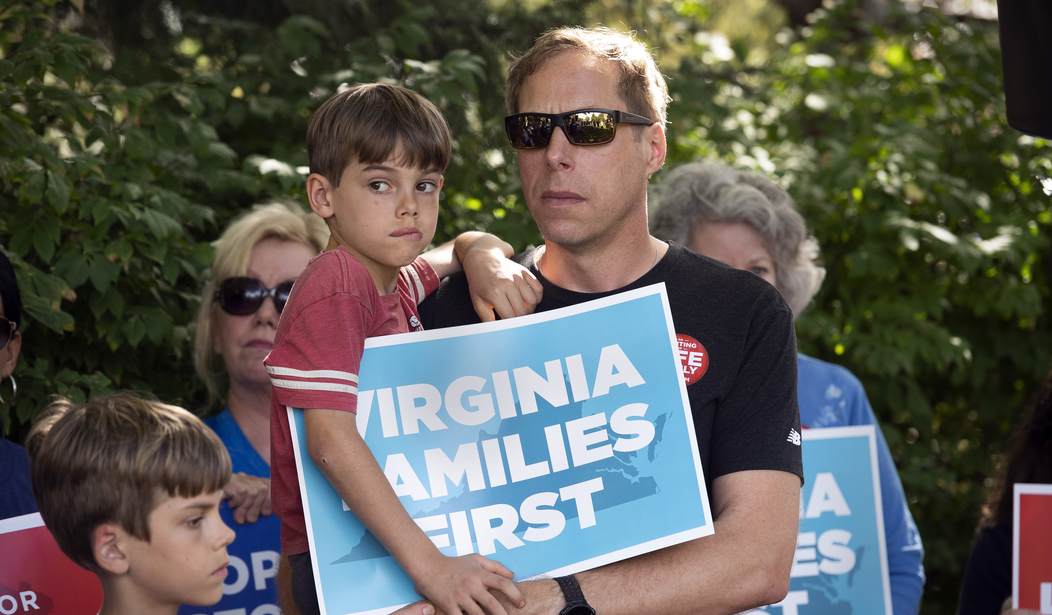Here’s a tip for Democrats going forward: Don’t poke mama and papa bears — especially when it comes to involvement in their kids’ education. If you provoke them, they’ll bite back. All in the name of protecting their cubs.
After being gaslighted by bureaucrats this past year and deemed domestic terrorists by the Department of Justice, these folks have had enough. On Election Day, they—along with their allies — sent a powerful message to the nation: unaccountable politicians are being put on notice.
Move over, teachers unions: parents are the new special interest group in town.
Funding Students Instead of Systems
For too long, Democratic Party-aligned teachers unions have inculcated young minds with propaganda and propelled the decline of American educational standards.
Schooling going virtual in spring 2020, however, was the straw that broke the camel’s back. If unaware before, parents now recognized something was awry with their coursework.
From critical race theory (CRT) pushes to discouraging merit-based admissions, moms and dads had enough. Many decided to pull their kids out of bad schools altogether—instead, transferring them to private schools or opting for homeschooling options.
Leading school choice advocate Corey DeAngelis says parents will support “funding students instead of systems.” He noted momentum for educational freedom was already brewing.
“2021 is the year of school choice, but we're just getting started,” DeAngelis said in an email to Townhall.com. “The teachers unions overplayed their hand and have awakened a sleeping giant: parents. These parents are the new special interest group in town - and they aren't going away any time soon. Politicians are going to have to listen to these parents going forward if they want to be politically successful. Many parents felt utterly powerless over the past year and a half when it came to K-12 education - and they're going to fight to make sure they never have to feel that way ever again.”
Recommended
He’s not wrong.
Republicans Win When They Campaign on School Choice
School choice is a winning issue for Republicans.
In 2018, now-Governor Ron DeSantis (R-FL) narrowly defeated former Tallahassee Mayor Andrew Gillumn when 100,000 African American mothers crossed-over to elect the former. As expected, he’s already signed corresponding legislation into law.
Incoming Virginia Governor Glenn Youngkin similarly made education, including school choice, a top campaign issue. In July Youngkin pledged, if elected, to “put the power back in the hands of parents by providing them with the information they need to make the best decisions for their children” and to “create at least 20 new innovation charter schools.”
Per the American Federation for Children, support for school choice is surging. A June 2021 RealClear Opinion Research poll noted: "According to a June poll from RealClear Opinion Research, polling more than 1762 registered voters, a majority support school choice (74% vs. 16% opposed) while 10% are unsure. This is true across party lines, with 83% of Republicans, 69% of Independents, and 70% of Democrats saying they strongly or somewhat support school choice. Additionally, a majority of voters (66%) say that some or all of the COVID funds the federal government set aside for K-12 education should be directed by parents. Most voters in both parties agree parents should direct all or some of the funding."
Capitalizing on these trends and recent victories, Republican lawmakers and candidates must pledge support for educational freedom and follow through.
Virginia Can Lead the Way
Virginia Code§ 1-240.1., pertaining to parental rights, states, “A parent has a fundamental right to make decisions concerning the upbringing, education, and care of the parent's child.”
Armed with a new governor and control of the House of Delegates, Republicans have a mandate to enact meaningful reforms in Richmond. Early signs already point to education being front and center come January 15th, 2022.
First, Governor-elect Glenn Youngkin has appointed school choice advocates to lead his transition team—including Lindsey Burke, director of Heritage Foundation’s Center for Education Policy: Lindsey M. Burke, Ph.D., director of the Center for Education Policy at The Heritage Foundation, will also serve on the transition team. She will focus on education and help to outline an agenda to ensure K-12 schools are accountable to families.
“I am honored to serve on the transition team and look forward to advancing policies that make Virginia's education system responsive and accountable to parents, putting them in charge. It's not the education bureaucracy but parents and students who should be in the driver's seat,” Burke said.
Second, incoming Virginia House of Delegates Speaker Todd Gilbert (R-Shenandoah) said education will be a legislative priority when the General Assembly convenes in January: “Absolutely, it’s education,” House Minority Leader Todd Gilbert, R-Shenandoah, said in a Zoom news conference on Thursday. Gilbert, who seeks to become speaker of the House when the GOP caucus votes privately on Nov. 14, said Gov.-elect Glenn Youngkin’s victorious campaign against former Gov. Terry McAuliffe has elevated parental concerns about control over their children’s education — from public school shutdowns during the COVID-19 pandemic to school safety and curriculum.
This is great news for school choice prospects.
Conclusion
America’s parents are the new, powerful special interest group.
They are empowered. They are making their voices heard. And they are ready to replace politicians who betray their interests.

























Join the conversation as a VIP Member